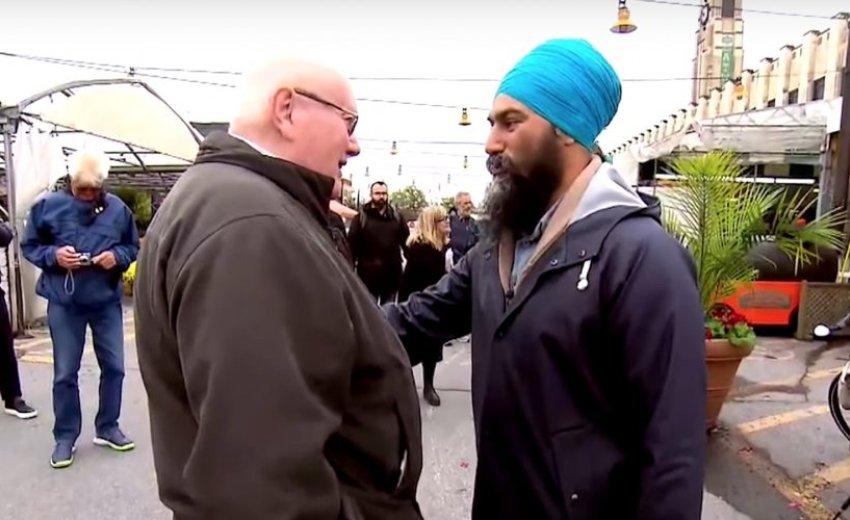Jagmeet Singh, the newly elected leader of the federal New Democratic Party, won people's hearts by handling an ignorant critic with maturity when he was accosted at the Atwater Market, Montreal, and told to remove his turban. There are several situations when he has faced racism or hatred and this was not the only time.
The NDP leader visited Montreal's market ahead of his crucial French-language debate with his wife, Gurkiran Kaur Sidhu. Jagmeet Singh encountered a man who urged him to "cut off" his turban to "look like a Canadian."
Here are some highlights from their conversation:
As Singh engaged prospective voters at Atwater Market this morning in front of media cameras and reporters, the man approached him.
As soon as they had shaken hands, he said, "You know what? You should cut your turban off," he said. "You'll look like a Canadian."
"Oh, I think Canadians look like all sorts of people," Singh replied. "That's the beauty of Canada."
"Yeah, but..." the man said — before Singh cut him off.
"That's okay, I don't agree, sir," he said.
"In Rome, you do as the Romans do," the man said.
"Hey, but this is Canada, you can do whatever you like," Singh gave a measured friendly response to the man and walked away.
"All right, take care, eh?" In surprisingly cordial parting words, the man called after him. "I hope you win."
This video went viral as soon as it was released, and news outlets all around the globe covered it. The focus of this coverage was the politeness of this exchange, with a general message: "See, we can disagree and still be civil to one another."
Jagmeet Singh’s poise and composure in the face of a slur won admiration from all.
To overcome hate and racism, Jagmeet Singh chose love and kindness, which is what makes him win the hearts of many Canadians. Singh is a practicing Sikh and wears a turban as a visible sign of his faith.
He is the first member of a visible minority to lead one of the major federal parties during an election campaign in which race and identity have emerged as key themes of discussion and debate.
Jagmeet Singh is the first non-white leader of a major party in Canada and is positioned as a secular politician. His ethos and sense of justice are inspired by the teachings of the Sikh Gurus.
In another incident, two Canadian political candidates tweeted a cartoon that depicted Jagmeet Singh with a bomb in his turban. In the image, Singh is depicted with a bomb with a burning fuse resting in his turban, which he wears as a practicing Sikh.
When asked for a comment on the cartoon, a spokesperson from Singh’s campaign said frankly: “Here’s a statement: This cartoon is unacceptable.”
Evan Balgord, the executive director of the Canadian Anti-Hate Network, which tracks the comments made by groups including the PPC, said, "It's racist, it's obvious."
The photo has been condemned as racist by progressive activists and news outlets across the country. The post also received alarming responses on social media.
In an interview with CTV News, Singh was asked about the cartoon shared on Twitter by People's Party of Canada candidate Mark Friesen. Jagmeet Singh said, “It’s one thing to have opinions and say that you disagree. Where it comes to the point where it’s not acceptable is when the goal is to simply just create hate or fear.”
While talking about the cartoon, Singh pointed to the deadly Quebec City mosque attack in 2017 which left six people dead.“We’ve seen the impacts in Quebec, when divisive or hateful language and rhetoric is spread, people can lose their lives,” Singh said.
Despite the explanation by the politician who posted the image, Singh doesn't believe that the image has nothing to do with racism rather he said, “I looked at the picture and it’s pretty obvious.”
The two incidents—the racist caricature and the man telling Singh to take off his turban—have garnered quite different reactions; the one has been celebrated, the latter condemned. Yet they are two sides of the same coin. Compared to the racist caricature or even to the more violent types of racism we are used to seeing on cable news and social media feeds, the man's suggestion to Singh may be a nicer and softer form of racism. Nice racism, though, is still racism. No matter how it's disguised, it's still detrimental.
No matter how nice racism may sound, it must be condemned. We must be aware of the detrimental effects "nice racism" has on many communities. Broader policy change is required to combat systemic racism and discrimination.
*Based on an article in RNS by Simran Jeet Singh, October 4, 2019
